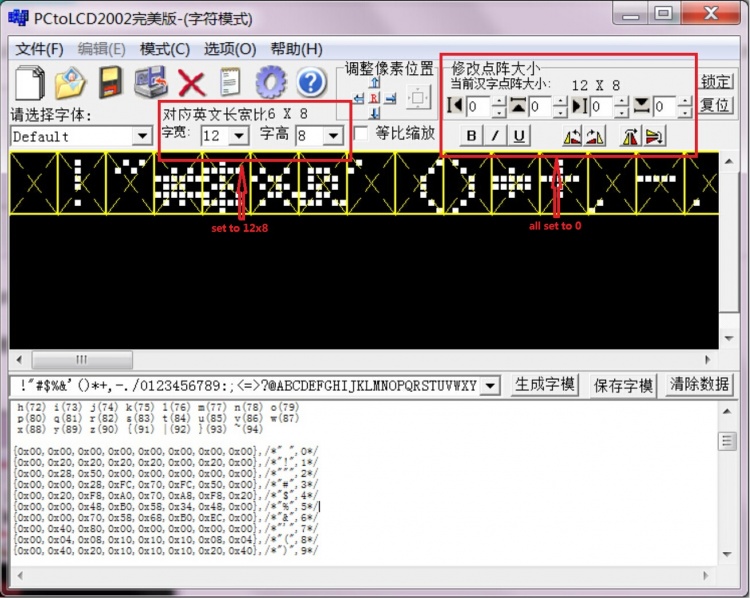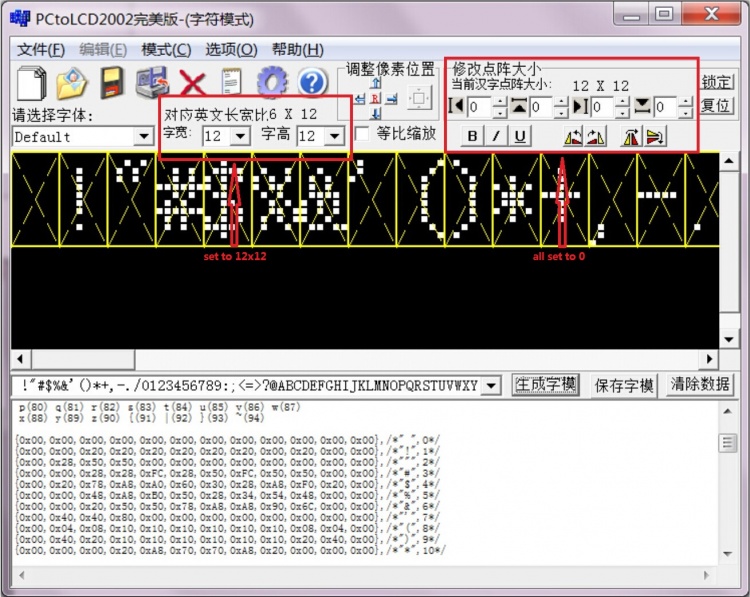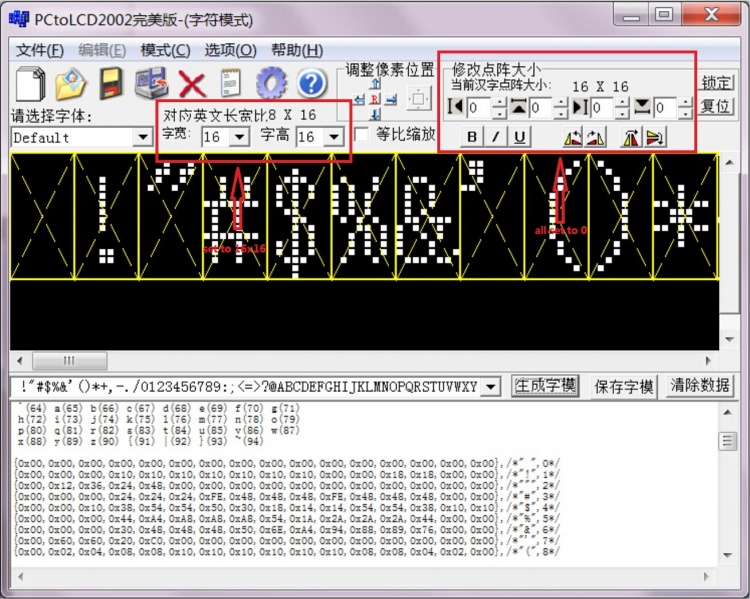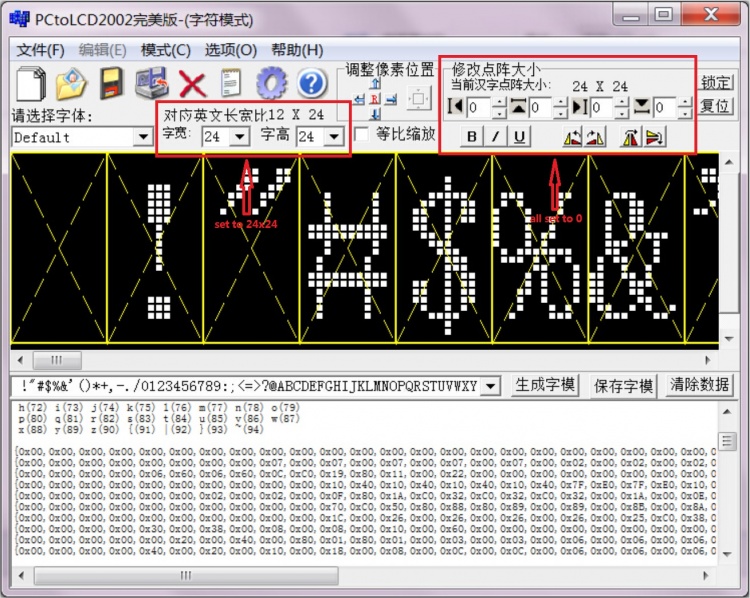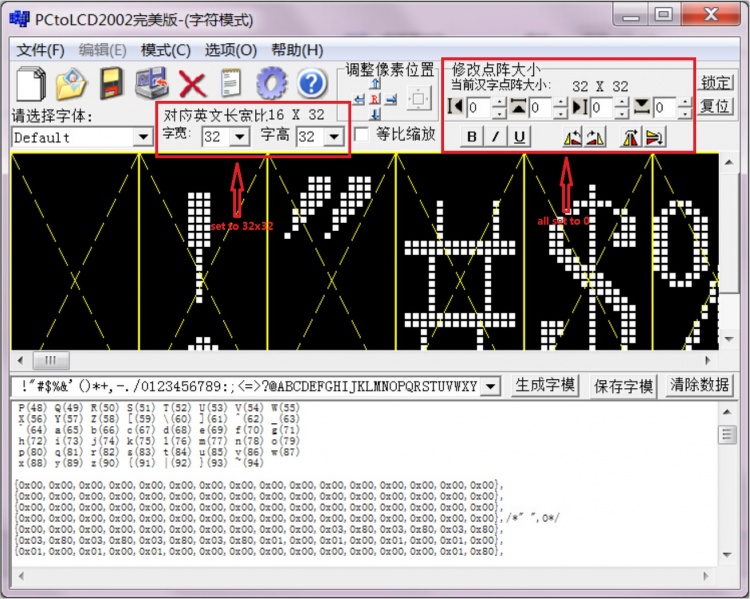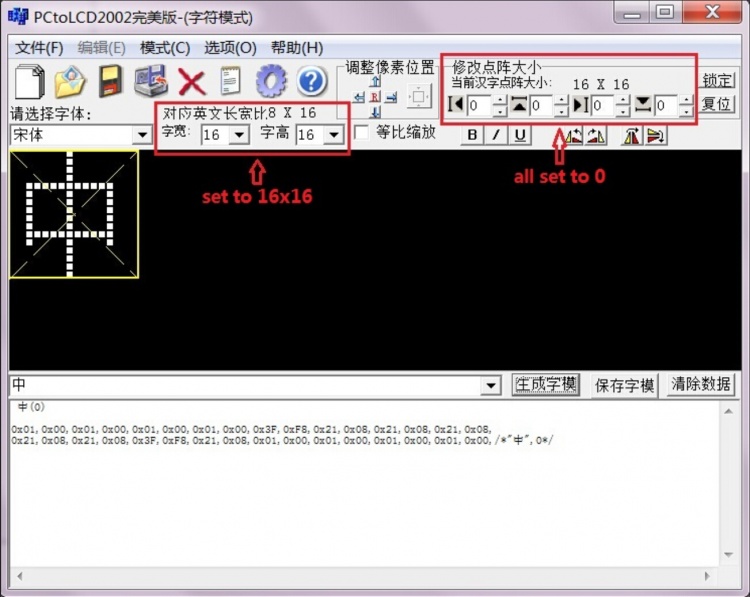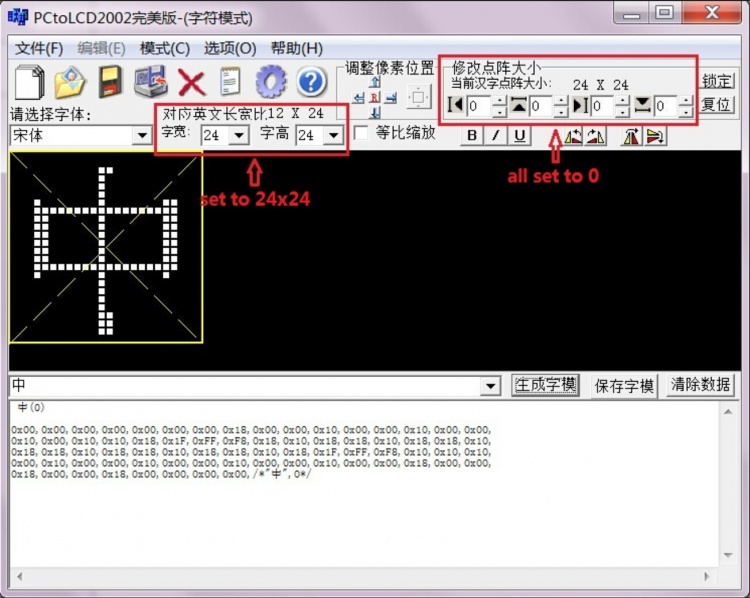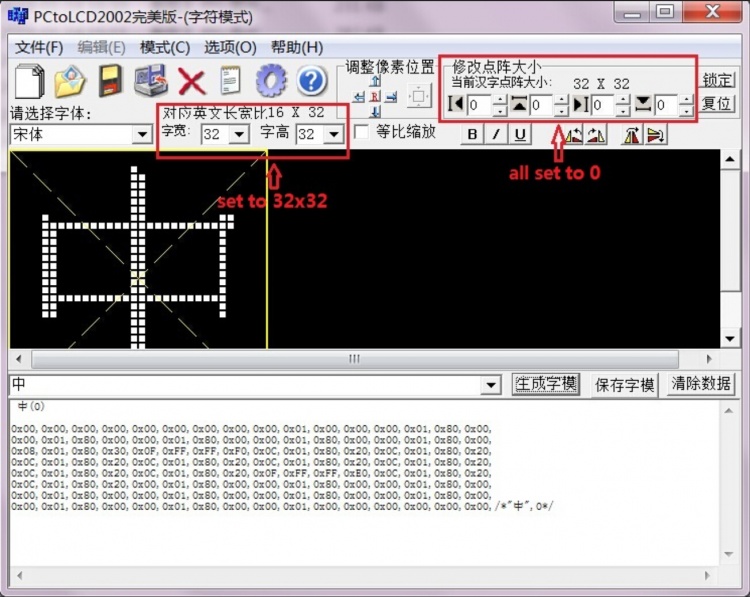More actions
| Line 338: | Line 338: | ||
}} | }} | ||
== <font color="blue"> | == <font color="blue">Chinese character modulo</font> == | ||
'''16x16 Chinese font modulo description''' | '''16x16 Chinese font modulo description''' | ||
:The size settings are as shown below: | :The size settings are as shown below: | ||
Revision as of 18:38, 19 July 2019
Molding software configuration
The font modulo software used in the test example is PCtoLCD2002. For detailed instructions on its use, see the following document:
PCtoLCD2002 Instructions for use
The PCtoLCD2002 software is specifically set as follows:
- Font and size selection
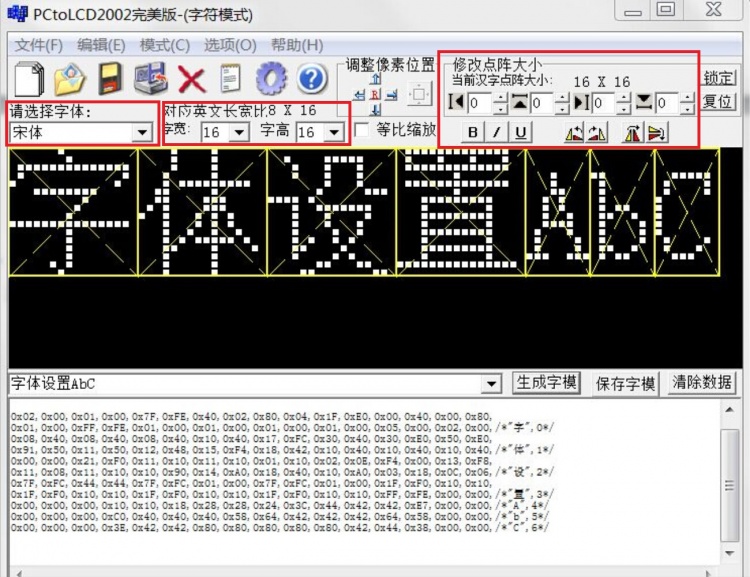
- Mode needs to select字符模式
- Fonts can be selected according to needs, such as selection宋体
- The word width and word height can be selected according to the needs. The font sizes commonly used in Chinese and English are as follows:
- Chinese (word width x word height):16x16、24x24、32x32
- English (character x word height):6x8、6x12、8x16、12x24、16x32(The corresponding font size needs to be set to respectively12x8、12x12、16x16、24x24、32x32)
- Modify the dot matrix size can be set according to requirements, generally set to0
- Font option setting
- There are many situations in the font option setting. Different settings and different code processing methods.
- Here is an example of the following settings, the subsequent function code is written based on this setting.
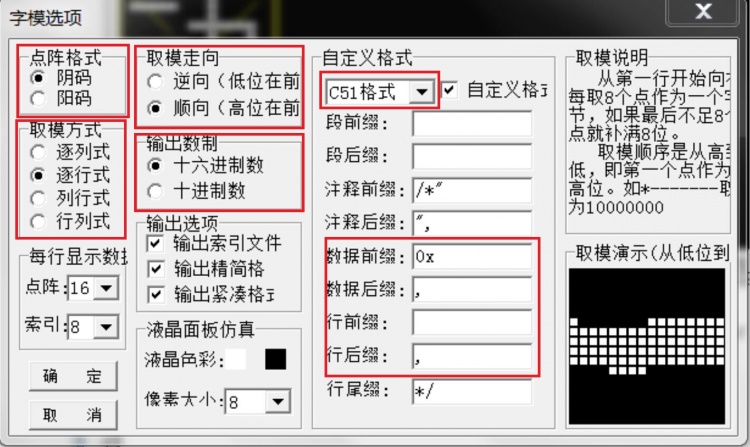
- Dot matrix format select 阴码
- Modal mode select 逐行式
- Molding trend select 顺向(高位在前)
- Output number system select 十六进制数
- Custom format select C51格式
Bottom support function
- LCD_SetWindows
- The function implementation differs depending on the driver IC (different drive ICs set coordinate values with different commands and principles),
- but the principle is basically the same, setting the start and end coordinates and setting a display area.
- Examples are as follows (ILI9341 as an example)
void LCD_SetWindows(u16 xStar, u16 yStar,u16 xEnd,u16 yEnd)
{
LCD_WR_REG(lcddev.setxcmd);
LCD_WR_DATA(xStar>>8);
LCD_WR_DATA(0x00FF&xStar);
LCD_WR_DATA(xEnd>>8);
LCD_WR_DATA(0x00FF&xEnd);
LCD_WR_REG(lcddev.setycmd);
LCD_WR_DATA(yStar>>8);
LCD_WR_DATA(0x00FF&yStar);
LCD_WR_DATA(yEnd>>8);
LCD_WR_DATA(0x00FF&yEnd);
LCD_WriteRAM_Prepare(); //Start writing to GRAM
}
- Lcd_WriteData_16Bit
- This function is to set the pixel color value into GRAM, and then display it
- Examples are as follows (ILI9341 as an example)
void Lcd_WriteData_16Bit(u16 Data)
{
LCD_CS_CLR;
LCD_RS_SET;
SPI_WriteByte(SPI2,Data>>8);
SPI_WriteByte(SPI2,Data);
LCD_CS_SET;
}
- LCD_DrawPoint
- In fact, the LCD_SetWindows function and the Lcd_WriteData_16Bit function are used to display a pixel.
- Examples are as follows (ILI9341 as an example)
void LCD_DrawPoint(u16 x,u16 y)
{
LCD_SetCursor(x,y);//Set the cursor position
Lcd_WriteData_16Bit(POINT_COLOR);
}
English character modulo
- 6x8 English font modulo description
static void LCD_Show_0806_char(u16 x,u16 y,u16 fc, u16 bc, u8 num,u8 mode)
{
u8 temp;
u8 pos,t;
u16 colortemp=POINT_COLOR;
num=num-' ';//Get the offset value
LCD_SetWindows(x,y,x+6-1,y+8-1);//Set a single text display window
if(!mode) //Non-overlay mode: The font has a background color, which will overwrite the original display
{
for(pos=0;pos<8;pos++)
{
temp = asc2_0806[num][pos];//Call 0806 font, you need to take the model definition
for(t=0;t<6;t++)
{
if(temp&0x80)
{
Lcd_WriteData_16Bit(fc);
}
else
{
Lcd_WriteData_16Bit(bc);
}
temp<<=1;
}
}
}
else//Overlay mode: the font does not have a background color, and is directly superimposed and displayed on the original display content
{
for(pos=0;pos<8;pos++)
{
temp = asc2_0806[num][pos];//Call 0806 font, you need to take the model definition
for(t=0;t<6;t++)
{
POINT_COLOR=fc;
if(temp&0x80)
{
LCD_DrawPoint(x+t,y+pos);//Draw a point
}
temp<<=1;
}
}
}
POINT_COLOR=colortemp;
LCD_SetWindows(0,0,lcddev.width-1,lcddev.height-1);//Restore window to full screen
}
- 6x12 English font modulo description
static void LCD_Show_1206_char(u16 x,u16 y,u16 fc, u16 bc, u8 num,u8 mode)
{
u8 temp;
u8 pos,t;
u16 colortemp=POINT_COLOR;
num=num-' ';//Get the offset value
LCD_SetWindows(x,y,x+6-1,y+12-1);//Set a single text display window
if(!mode) //Non-overlay mode: The font has a background color, which will overwrite the original display
{
for(pos=0;pos<12;pos++)
{
temp = asc2_1206[num][pos];//Call 1206 font, you need to take the model definition
for(t=0;t<6;t++)
{
if(temp&0x80)
{
Lcd_WriteData_16Bit(fc);
}
else
{
Lcd_WriteData_16Bit(bc);
}
temp<<=1;
}
}
}
else//Overlay mode: the font does not have a background color, and is directly superimposed and displayed on the original display content
{
for(pos=0;pos<12;pos++)
{
temp = asc2_1206[num][pos];//Call 1206 font, you need to take the model definition
for(t=0;t<6;t++)
{
POINT_COLOR=fc;
if(temp&0x80)
{
LCD_DrawPoint(x+t,y+pos);//Draw a point
}
temp<<=1;
}
}
}
POINT_COLOR=colortemp;
LCD_SetWindows(0,0,lcddev.width-1,lcddev.height-1);//Restore window to full screen
}
- 8x16 English font modulo description
static void LCD_Show_1608_char(u16 x,u16 y,u16 fc, u16 bc, u8 num,u8 mode)
{
u8 temp;
u8 pos,t;
u16 colortemp=POINT_COLOR;
num=num-' ';//Get the offset value
LCD_SetWindows(x,y,x+8-1,y+16-1);//Set a single text display window
if(!mode) //Non-overlay mode: The font has a background color, which will overwrite the original display
{
for(pos=0;pos<16;pos++)
{
temp = asc2_1608[num][pos];//Call 1608 font, you need to take the model definition
for(t=0;t<8;t++)
{
if(temp&0x80)
{
Lcd_WriteData_16Bit(fc);
}
else
{
Lcd_WriteData_16Bit(bc);
}
temp<<=1;
}
}
}
else//Overlay mode: the font does not have a background color, and is directly superimposed and displayed on the original display content
{
for(pos=0;pos<16;pos++)
{
temp = asc2_1608[num][pos];//Call 1608 font, you need to take the model definition
for(t=0;t<8;t++)
{
POINT_COLOR=fc;
if(temp&0x80)
{
LCD_DrawPoint(x+t,y+pos);//Draw a point
}
temp<<=1;
}
}
}
POINT_COLOR=colortemp;
LCD_SetWindows(0,0,lcddev.width-1,lcddev.height-1);//Restore window to full screen
}
- 12x24 English font modulo description
static void LCD_Show_2412_char(u16 x,u16 y,u16 fc, u16 bc, u8 num,u8 mode)
{
u16 temp;
u8 pos,t;
u16 colortemp=POINT_COLOR;
num=num-' ';//Get the offset value
LCD_SetWindows(x,y,x+12-1,y+24-1);//Set a single text display window
if(!mode) //Non-overlay mode: The font has a background color, which will overwrite the original display
{
for(pos=0;pos<24;pos++)
{
temp = (asc2_2412[num][pos*2]<<8)|asc2_2412[num][pos*2+1];//Call 2412 font, you need to take the model definition
for(t=0;t<12;t++)
{
if(temp&0x8000)
{
Lcd_WriteData_16Bit(fc);
}
else
{
Lcd_WriteData_16Bit(bc);
}
temp<<=1;
}
}
}
else//Overlay mode: the font does not have a background color, and is directly superimposed and displayed on the original display content
{
for(pos=0;pos<24;pos++)
{
temp = (asc2_2412[num][pos*2]<<8)|asc2_2412[num][pos*2+1];//Call 2412 font, you need to take the model definition
for(t=0;t<12;t++)
{
POINT_COLOR=fc;
if(temp&0x8000)
{
LCD_DrawPoint(x+t,y+pos);//Draw a point
}
temp<<=1;
}
}
}
POINT_COLOR=colortemp;
LCD_SetWindows(0,0,lcddev.width-1,lcddev.height-1);//Restore window to full screen
}
- 16x32 English font modulo description
static void LCD_Show_3216_char(u16 x,u16 y,u16 fc, u16 bc, u8 num,u8 mode)
{
u16 temp;
u8 pos,t;
u16 colortemp=POINT_COLOR;
num=num-' ';//Get the offset value
LCD_SetWindows(x,y,x+16-1,y+32-1);//Set a single text display window
if(!mode) //Non-overlay mode: The font has a background color, which will overwrite the original display
{
for(pos=0;pos<32;pos++)
{
temp = (asc2_3216[num][pos*2]<<8)|asc2_3216[num][pos*2+1];//Call 3216 font, you need to take the model definition
for(t=0;t<16;t++)
{
if(temp&0x8000)
{
Lcd_WriteData_16Bit(fc);
}
else
{
Lcd_WriteData_16Bit(bc);
}
temp<<=1;
}
}
}
else//Overlay mode: the font does not have a background color, and is directly superimposed and displayed on the original display content
{
for(pos=0;pos<32;pos++)
{
temp = (asc2_3216[num][pos*2]<<8)|asc2_3216[num][pos*2+1];//Call 3216 font, you need to take the model definition
for(t=0;t<16;t++)
{
POINT_COLOR=fc;
if(temp&(0x8000))
{
LCD_DrawPoint(x+t,y+pos);//Draw a point
}
temp<<=1;
}
}
}
POINT_COLOR=colortemp;
LCD_SetWindows(0,0,lcddev.width-1,lcddev.height-1);//Restore window to full screen
}
Chinese character modulo
16x16 Chinese font modulo description
void GUI_DrawFont16(u16 x, u16 y, u16 fc, u16 bc, u8 *s,u8 mode)
{
u8 i,j;
u16 k;
u16 HZnum;
u16 x0=x;
HZnum=sizeof(tfont16)/sizeof(typFNT_GB16); //Automatic statistics of the number of Chinese characters
for (k=0;k<HZnum;k++)
{
if((tfont16[k].Index[0]==*(s))&&(tfont16[k].Index[1]==*(s+1)))
{
LCD_SetWindows(x,y,x+16-1,y+16-1);
for(i=0;i<16*2;i++)
{
for(j=0;j<8;j++)
{
if(!mode) //Non-overlay mode: The font has a background color, which will overwrite the original display
{
if(tfont16[k].Msk[i]&(0x80>>j))
{
Lcd_WriteData_16Bit(fc);
}
else
{
Lcd_WriteData_16Bit(bc);
}
}
else //Overlay mode: the font does not have a background color, and is directly superimposed and displayed on the original display content
{
POINT_COLOR=fc;
if(tfont16[k].Msk[i]&(0x80>>j))
{
LCD_DrawPoint(x,y);//Draw a point
}
x++;
if((x-x0)==16)
{
x=x0;
y++;
break;
}
}
}
}
}
continue; //Find the corresponding dot matrix font to exit immediately, to prevent the impact of multiple Chinese characters repeated modulo
}
LCD_SetWindows(0,0,lcddev.width-1,lcddev.height-1);//Restore window to full screen
}
24x24 Chinese Chinese font modulo description
void GUI_DrawFont24(u16 x, u16 y, u16 fc, u16 bc, u8 *s,u8 mode)
{
u8 i,j;
u16 k;
u16 HZnum;
u16 x0=x;
HZnum=sizeof(tfont24)/sizeof(typFNT_GB24); //Automatic statistics of the number of Chinese characters
for (k=0;k<HZnum;k++)
{
if((tfont24[k].Index[0]==*(s))&&(tfont24[k].Index[1]==*(s+1)))
{
LCD_SetWindows(x,y,x+24-1,y+24-1);
for(i=0;i<24*3;i++)
{
for(j=0;j<8;j++)
{
if(!mode) //Non-overlay mode: The font has a background color, which will overwrite the original display
{
if(tfont24[k].Msk[i]&(0x80>>j))
{
Lcd_WriteData_16Bit(fc);
}
else
{
Lcd_WriteData_16Bit(bc);
}
}
else //Overlay mode: the font does not have a background color, and is directly superimposed and displayed on the original display content
{
POINT_COLOR=fc;
if(tfont24[k].Msk[i]&(0x80>>j))
{
LCD_DrawPoint(x,y);// Draw a point
}
x++;
if((x-x0)==24)
{
x=x0;
y++;
break;
}
}
}
}
}
continue; //Find the corresponding dot matrix font to exit immediately, to prevent the impact of multiple Chinese characters repeated modulo
}
LCD_SetWindows(0,0,lcddev.width-1,lcddev.height-1);// Restore window to full screen
}
32x32 Chinese Chinese font modulo description
void GUI_DrawFont32(u16 x, u16 y, u16 fc, u16 bc, u8 *s,u8 mode)
{
u8 i,j;
u16 k;
u16 HZnum;
u16 x0=x;
HZnum=sizeof(tfont32)/sizeof(typFNT_GB32); //Automatic statistics of the number of Chinese characters
for (k=0;k<HZnum;k++)
{
if ((tfont32[k].Index[0]==*(s))&&(tfont32[k].Index[1]==*(s+1)))
{
LCD_SetWindows(x,y,x+32-1,y+32-1);
for(i=0;i<32*4;i++)
{
for(j=0;j<8;j++)
{
if(!mode) //Non-overlay mode: The font has a background color, which will overwrite the original display
{
if(tfont32[k].Msk[i]&(0x80>>j))
{
Lcd_WriteData_16Bit(fc);
}
else
{
Lcd_WriteData_16Bit(bc);
}
}
else //Overlay mode: the font does not have a background color, and is directly superimposed and displayed on the original display content
{
POINT_COLOR=fc;
if(tfont32[k].Msk[i]&(0x80>>j))
{
LCD_DrawPoint(x,y);// Draw a point
}
x++;
if((x-x0)==32)
{
x=x0;
y++;
break;
}
}
}
}
}
continue; //Find the corresponding dot matrix font to exit immediately, to prevent the impact of multiple Chinese characters repeated modulo
}
LCD_SetWindows(0,0,lcddev.width-1,lcddev.height-1);// Restore window to full screen
}

